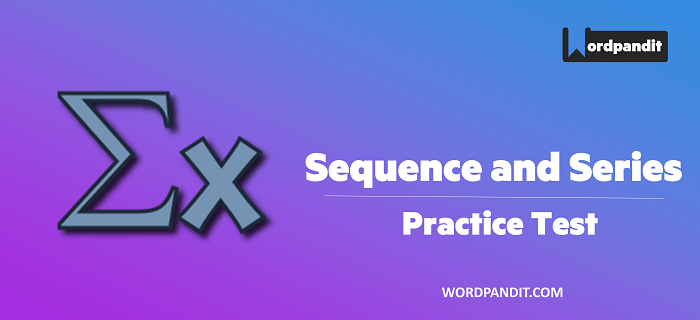- This is an assessment test.
- To draw maximum benefit, study the concepts for the topic concerned.
- Kindly take the tests in this series with a pre-defined schedule.
Algebra: Sequence and Series Test-4
Congratulations - you have completed Algebra: Sequence and Series Test-4.You scored %%SCORE%% out of %%TOTAL%%.You correct answer percentage: %%PERCENTAGE%% .Your performance has been rated as %%RATING%%
Your answers are highlighted below.
Question 1 |
If the 4th term of an arithmetic progression is 14 and the 12th term is 70, then the first, term is:
–10 | |
–7 | |
+7 | |
+10 |
Question 1 Explanation:
Let the common difference be d.
14+8d=70,
=> d=7.
First term is 14-3d=14-2 x 7=-7.
The correct option is (b)
14+8d=70,
=> d=7.
First term is 14-3d=14-2 x 7=-7.
The correct option is (b)
Question 2 |
By adding the same constant to each of 31, 7, –1 a geometric progression results. The common ratio is:
$ \displaystyle 13$ | |
$ \displaystyle 2\frac{1}{3}$ | |
$ \displaystyle -12$ | |
$ \displaystyle None\,\,of\,\,these$ |
Question 2 Explanation:
$ \begin{array}{l}(x+31)(x-1)={{(x+7)}^{2}}\\=>{{x}^{2}}+14x+49={{x}^{2}}+30x-31\\=>16x=80\\=>x=5\end{array}$
Question 3 |
The Value of
$ \displaystyle \begin{array}{l}\frac{3}{{{1}^{2}}{{.2}^{2}}}+\frac{5}{{{2}^{2}}{{.3}^{2}}}+\frac{7}{{{3}^{2}}{{.4}^{2}}}+\frac{9}{{{4}^{2}}{{.5}^{2}}}+\frac{11}{{{5}^{2}}{{.6}^{2}}}\\+\frac{13}{{{6}^{2}}{{.7}^{2}}}+\frac{15}{{{7}^{2}}{{.8}^{2}}}+\frac{17}{{{8}^{2}}{{.9}^{2}}}+\frac{19}{{{9}^{2}}{{.10}^{2}}}\,\,is\end{array}$
$ \displaystyle \begin{array}{l}\frac{3}{{{1}^{2}}{{.2}^{2}}}+\frac{5}{{{2}^{2}}{{.3}^{2}}}+\frac{7}{{{3}^{2}}{{.4}^{2}}}+\frac{9}{{{4}^{2}}{{.5}^{2}}}+\frac{11}{{{5}^{2}}{{.6}^{2}}}\\+\frac{13}{{{6}^{2}}{{.7}^{2}}}+\frac{15}{{{7}^{2}}{{.8}^{2}}}+\frac{17}{{{8}^{2}}{{.9}^{2}}}+\frac{19}{{{9}^{2}}{{.10}^{2}}}\,\,is\end{array}$
$ \displaystyle \frac{1}{100}$ | |
$ \displaystyle \frac{99}{100}$ | |
$ \displaystyle \frac{101}{100}$ | |
$ \displaystyle 1$ |
Question 3 Explanation:
$ \begin{array}{l}\frac{3}{{{1}^{2}}{{.2}^{2}}}+\frac{5}{{{2}^{2}}{{.3}^{2}}}+\frac{7}{{{3}^{2}}{{.4}^{2}}}+\frac{9}{{{4}^{2}}{{.5}^{2}}}\\+\frac{11}{{{5}^{2}}{{.6}^{2}}}+\frac{13}{{{6}^{2}}{{.7}^{2}}}+\frac{15}{{{7}^{2}}{{.8}^{2}}}+\frac{17}{{{8}^{2}}{{.9}^{2}}}+\frac{19}{{{9}^{2}}{{.10}^{2}}}\,\\=\frac{4-1}{{{1}^{2}}{{.2}^{2}}}+\frac{9-4}{{{2}^{2}}{{.3}^{2}}}+\frac{16-9}{{{3}^{2}}{{.4}^{2}}}+\frac{25-16}{{{4}^{2}}{{.5}^{2}}}\\+\frac{36-25}{{{5}^{2}}{{.6}^{2}}}+\frac{49-36}{{{6}^{2}}{{.7}^{2}}}+\frac{64-49}{{{7}^{2}}{{.8}^{2}}}\\+\frac{81-64}{{{8}^{2}}{{.9}^{2}}}+\frac{100-81}{{{9}^{2}}{{.10}^{2}}}\\=\frac{1}{{{1}^{2}}}-\,\frac{1}{{{2}^{2}}}+\frac{1}{{{2}^{2}}}-\,\frac{1}{{{3}^{2}}}+\frac{1}{{{3}^{2}}}-\,\frac{1}{{{4}^{2}}}\\+\frac{1}{{{4}^{2}}}-\,\frac{1}{{{5}^{2}}}+\frac{1}{{{5}^{2}}}-\,\frac{1}{{{6}^{2}}}\\+\frac{1}{{{6}^{2}}}-\,\frac{1}{{{7}^{2}}}+\frac{1}{{{7}^{2}}}-\,\frac{1}{{{8}^{2}}}\\+\frac{1}{{{8}^{2}}}-\,\frac{1}{{{9}^{2}}}+\frac{1}{{{9}^{2}}}-\,\frac{1}{{{10}^{2}}}\\=1-\frac{1}{100}\\=\frac{99}{100}\end{array}$
Question 4 |
The value of
$ \displaystyle 1-\frac{1}{20}+\frac{1}{{{20}^{2}}}-\frac{1}{{{20}^{3}}}+.....$ Correct to 5 places f decimal is:
$ \displaystyle 1-\frac{1}{20}+\frac{1}{{{20}^{2}}}-\frac{1}{{{20}^{3}}}+.....$ Correct to 5 places f decimal is:
1.05 | |
0.9 | |
2.9 | |
0.5 |
Question 4 Explanation:
The series is a G.P. and the common ratio is (-1/20) .
Thus the infinite GP sum is (20/21) = 0.9
Thus the correct option is (b)
Thus the infinite GP sum is (20/21) = 0.9
Thus the correct option is (b)
Question 5 |
For all integral values of n,
the largest number that exactly divides each number of the sequence
$ \displaystyle \begin{array}{l}\left( n-1 \right)\,n\,\left( n+1 \right)\,,\,\,\\n\,\left( n+1 \right)\,\left( n+2 \right),\,\,\\\left( n+1 \right)\,\left( n+2 \right)\,\left( n+3 \right)\,.......is\end{array}$
the largest number that exactly divides each number of the sequence
$ \displaystyle \begin{array}{l}\left( n-1 \right)\,n\,\left( n+1 \right)\,,\,\,\\n\,\left( n+1 \right)\,\left( n+2 \right),\,\,\\\left( n+1 \right)\,\left( n+2 \right)\,\left( n+3 \right)\,.......is\end{array}$
12 | |
6 | |
3 | |
2 |
Question 5 Explanation:
Any three consecutive numbers is divisible by 6. Thus the correct option is (b).
Once you are finished, click the button below. Any items you have not completed will be marked incorrect.
There are 5 questions to complete.
List |






